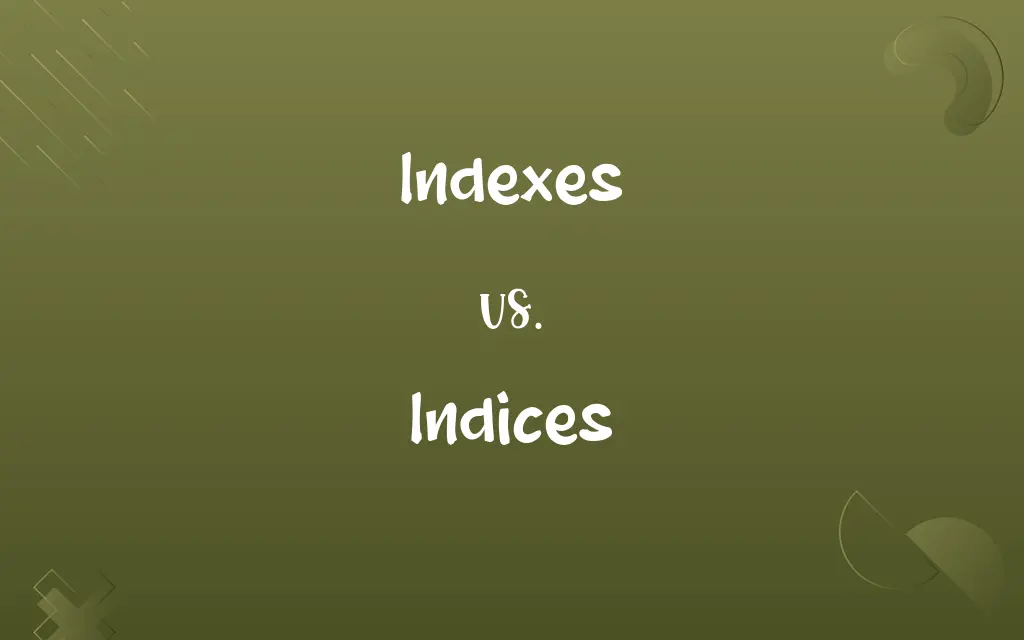Indexes vs. Indices: Know the Difference

By Shumaila Saeed || Updated on December 25, 2023
Indexes and indices are both plural forms of "index"; "indexes" is more common in American English, while "indices" is preferred in academic or technical contexts.

Key Differences
"Indexes" is predominantly used in American English, reflecting a more straightforward pluralization of "index". In contrast, "Indices" is often used in British English and in more formal or academic settings, preserving the Latin origin of the word.
Shumaila Saeed
Dec 04, 2023
In general literature and everyday language, "indexes" is commonly used. However, in specialized fields like mathematics, science, and finance, "indices" is the preferred term, aligning with the technical and formal nature of these fields.
Shumaila Saeed
Dec 04, 2023
"Indexes" represents a linguistic evolution where English adapts foreign words to its standard pluralization rules. "Indices", on the other hand, maintains the original Latin plural form of "index", showcasing the preservation of etymological roots.
Shumaila Saeed
Dec 04, 2023
The use of "indexes" is often seen as more modern and less formal, while "indices" carries a more classical and scholarly connotation. This difference in perception influences the choice of term based on the desired tone and style of writing.
Shumaila Saeed
Dec 04, 2023
Both "indexes" and "indices" are correct and interchangeable in many contexts. The preference for one over the other often depends on the writer's style, the audience, and the specific field of study or interest.
Shumaila Saeed
Dec 04, 2023
ADVERTISEMENT
Comparison Chart
Language Variant
More common in American English
Often used in British English
Shumaila Saeed
Dec 04, 2023
Contextual Use
Regular literature, general contexts
Technical, academic, and formal fields
Shumaila Saeed
Dec 04, 2023
Linguistic Evolution
Adheres to English pluralization norms
Preserves original Latin plural form
Shumaila Saeed
Dec 04, 2023
Flexibility
Interchangeable in many contexts
Used specifically in certain disciplines
Shumaila Saeed
Dec 04, 2023
ADVERTISEMENT
Indexes and Indices Definitions
Indexes
To categorize or list systematically for easy reference.
The documents were indexes alphabetically.
Shumaila Saeed
Dec 04, 2023
Indices
Indicators or measures in scientific and economic contexts.
The Dow Jones and S&P are major financial indices.
Shumaila Saeed
Dec 04, 2023
Indexes
Indicators or measures of something.
The economic indexes are showing signs of improvement.
Shumaila Saeed
Dec 04, 2023
Indices
Mathematical symbols representing quantities (exponents or subscripts).
In the equation x^2, 2 is one of the indices.
Shumaila Saeed
Dec 04, 2023
Indexes
In computing, a database element that improves data retrieval speed.
Proper indexes in the database can drastically reduce query times.
Shumaila Saeed
Dec 04, 2023
ADVERTISEMENT
Indices
A listing of database keys used to optimize search performance.
Database performance improved after optimizing the indices.
Shumaila Saeed
Dec 04, 2023
Indexes
An alphabetized list of names, places, and subjects treated in a printed work, giving the page or pages on which each item is mentioned.
Shumaila Saeed
Oct 19, 2023
Indices
Reference markers in technical or scholarly works.
The book's indices are thorough and well-organized.
Shumaila Saeed
Dec 04, 2023
Indices
Signs or indications of a particular state or condition.
The indices of climate change are increasingly evident.
Shumaila Saeed
Dec 04, 2023
Indexes
(Computers) A list of keywords associated with a record or document, used especially as an aid in searching for information.
Shumaila Saeed
Oct 19, 2023
Indexes
Something that reveals or indicates; a sign
"Her face ... was a fair index to her disposition" (Samuel Butler).
Shumaila Saeed
Oct 19, 2023
Indexes
A character (☞) used in printing to call attention to a particular paragraph or section. Also called hand.
Shumaila Saeed
Oct 19, 2023
Indexes
(Mathematics) A number or symbol, often written as a subscript or superscript to a mathematical expression, that indicates an operation to be performed, an ordering relation, or a use of the associated expression.
Shumaila Saeed
Oct 19, 2023
Indexes
A number derived from a formula, used to characterize a set of data.
Shumaila Saeed
Oct 19, 2023
Indexes
A statistical value that represents the price or value of an aggregate of goods, services, wages, or other measurable quantities in comparison with a reference number for a previous period of time.
Shumaila Saeed
Oct 19, 2023
Indexes
A number that represents the change in price or value of stocks or other securities in a particular market, sector, or asset class.
Shumaila Saeed
Oct 19, 2023
Indexes
Index Roman Catholic Church A list formerly published by Church authority, restricting or forbidding the reading of certain books.
Shumaila Saeed
Oct 19, 2023
Indexes
A list of names or topics mentioned in a text, usually at the end.
The book's indexes made it easy to find specific topics.
Shumaila Saeed
Dec 04, 2023
Indexes
Devices or systems used for automatic referencing or retrieval.
The library's digital indexes simplify research.
Shumaila Saeed
Dec 04, 2023
Repeatedly Asked Queries
Are "indexes" and "indices" interchangeable?
Yes, they are often interchangeable, though "indices" is more formal.
Shumaila Saeed
Dec 04, 2023
Are "indices" used in specific fields?
Yes, "indices" is preferred in academic, scientific, and financial contexts.
Shumaila Saeed
Dec 04, 2023
Is "indices" the original Latin plural of "index"?
Yes, "indices" maintains the original Latin pluralization.
Shumaila Saeed
Dec 04, 2023
Is "indexes" a modern adaptation of "index"?
Yes, it reflects the modern English approach to pluralization.
Shumaila Saeed
Dec 04, 2023
Is "indexes" more common in American English?
Yes, "indexes" is more commonly used in American English.
Shumaila Saeed
Dec 04, 2023
Is "indexes" considered less formal than "indices"?
Generally, yes, "indexes" is seen as less formal.
Shumaila Saeed
Dec 04, 2023
Can "indexes" be used in formal writing?
Yes, though "indices" might be preferred for a more formal tone.
Shumaila Saeed
Dec 04, 2023
Can "indexes" refer to economic indicators?
Yes, it can refer to various types of indicators, including economic ones.
Shumaila Saeed
Dec 04, 2023
Do both "indexes" and "indices" refer to a list at the end of a book?
Yes, both can refer to a bibliographic list in a book.
Shumaila Saeed
Dec 04, 2023
Does the choice between "indexes" and "indices" depend on audience?
Yes, the choice often depends on the audience and the context.
Shumaila Saeed
Dec 04, 2023
Can "indices" be used in non-academic writing?
Yes, though it might add a formal or scholarly tone.
Shumaila Saeed
Dec 04, 2023
Is "indices" used in mathematics?
Yes, especially for exponents or other mathematical notations.
Shumaila Saeed
Dec 04, 2023
Can "indices" be used in everyday language?
It can, but "indexes" is more common in casual usage.
Shumaila Saeed
Dec 04, 2023
Can "indexes" be used in scientific contexts?
Yes, but "indices" might be more common in such fields.
Shumaila Saeed
Dec 04, 2023
Are both terms used in database terminology?
Yes, both are used to refer to database search optimization tools.
Shumaila Saeed
Dec 04, 2023
Do "indexes" and "indices" have similar meanings in computing?
Yes, both refer to elements that enhance data retrieval.
Shumaila Saeed
Dec 04, 2023
Is "indices" commonly used in the finance sector?
Yes, particularly for stock market indices.
Shumaila Saeed
Dec 04, 2023
Are "indexes" and "indices" used in library science?
Yes, in reference to cataloguing and retrieval systems.
Shumaila Saeed
Dec 04, 2023
Is the use of "indices" declining in modern English?
Not significantly; it remains prevalent in formal and specialized contexts.
Shumaila Saeed
Dec 04, 2023
Do "indexes" and "indices" have the same pronunciation?
No, they are pronounced differently.
Shumaila Saeed
Dec 04, 2023
Share this page
Link for your blog / website
HTML
Link to share via messenger
About Author
Written by
Shumaila SaeedShumaila Saeed, an expert content creator with 6 years of experience, specializes in distilling complex topics into easily digestible comparisons, shining a light on the nuances that both inform and educate readers with clarity and accuracy.








































































